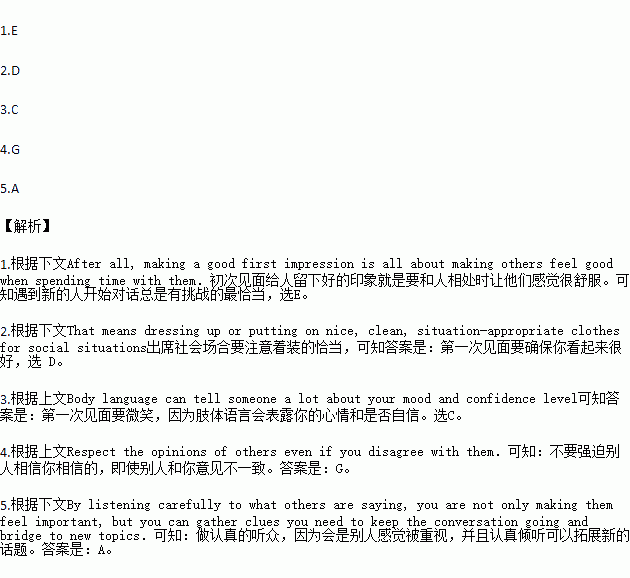题目内容
People often say you never get a second chance to make a first impression, and that's actually quite true.1. After all, making a good first impression is all about making others feel good when spending time with them.The following tips will help you make a positive impression every time.
● Dress appropriately
2.That means dressing up or putting on nice, clean, situation-appropriate clothes for social situations.It isn't difficult and it doesn't have to cost you much, either.
● Be aware of your body language
Words express very little of what you say.Body language can tell someone a lot about your mood and confidence level.3. Eye contact is an easy way to make others feel comfortable, important and special.Nervous body language can make others uncomfortable and anxious.Try to be aware of your body language when communicating with others.
● Respect the opinions of others
Not everyone will have the same opinion with you, and friendly disagreements can be a gateway to a great conversation. Respect other people's right to have their own opinion.Respect the opinions of others even if you disagree with them.4.
●5..
People love talking about themselves, but generally, you want to be careful of taking over the conversation.By listening carefully to what others are saying, you are not only making them feel important, but you can gather clues you need to keep the conversation going and bridge to new topics.
A.Be a careful listener.
B.Show an interest in every person you meet.
C.Smile especially when first meeting someone.
D.Make sure you look nice whenever you meet someone new.
E.Meeting new people and starting conversations is often challenging.
F.Others will want to be with you and help you make a good impression.
G.Don't force others to believe what you believe or to see things only as you see them.
B
Chemical Safety
Procedures for handling chemical spills(泄露) and leaks.
Chemical spills and leaks can be broken down into two basic types: simple spills, which you can clean up yourself and complicated spills, which require outside assistance.
If your spill meets ANY of the following conditions, it is a COMPLICATED SPILL.
? A person is injured; or
? The identity of the chemical is unknown; or
? Multiple chemicals are involved; or
? The chemical is highly poisonous, flammable (可燃的) or reactive ; or
? The spill/leak occurs in a “public space” such as a corridor; or
? The spill/leak has the potential to spread to other parts of the building such as through the ventilation (通风) system; or
? The clean up procedures are not known or appropriate materials are not readily available; or
? The clean up requires a respirator (呼吸器) (including cartridge respirators) to be worn and no personnel have been trained and fit-tested in accordance(一致) with the campus Respiratory Protection Program; or
? The spill/leak may endanger the environment by reaching waterways or outside ground, or by going down a drain
If none of the above conditions are met, the spill is defined as a simple spill. You may clean up simple spills in accordance with Chapter 6 of the Chemical Safety Guide. For consultative assistance, call Division of Research Safety (DSR) at 333-2755.
How to report a complicated spill 1. Evacuate(撤退) to a safe location, and alert others to evacuate. 2. Dial 9-911 from a campus phone. 3. Tell the operator you are calling to report a chemical spill at the University of Illinois. 4. Have the following information ready. ? Name of chemical ? Quantity spilled ? Location of spill (Full building name and room number) ? Number of people injured or slashed ? If applicable, the occurrence of a fire or explosion ? Your name and phone number 5. Have someone knowledgeable about the chemical spilled meet the fire department at the main entrance to your building. Take a Material Safety Data Sheet (MSDS) of the chemical, if it is readily available. |
1.Which of the following situation can be classified as a simple spill?
A. Some spilled liquid causes a fire in the building.
B. Yellow and green gases are leaking from the storage room.
C. An unknown red chemical is found on the corridor floor.
D. A researcher spills his milk all over the lab floor.
2.According to the safety instructions, upon discovering a complicated spill on campus, people should _________.
A. put on a respirator as soon as possible
B. refer to Chapter 6 of the Chemical Safety Guide
C. get away from the spill and report it to authorities
D. call Division of the Research Safety at 333-2755
3.“MSDS” in the passage possibly refers to _____.
A. a mask
B. an explanation about the chemical
C. a device
D. another kind of chemical
4.Who are most possibly the targeted audiences of this article?
A. Students in the Chemistry Department of a university.
B. Researchers working at Chemical Institution of Illinois.
C. Members of Division of Research Safety.
D. Staff members at a chemical manufacturing company.
5.The purpose of the material above is to ____________ .
A. inform people of the dangers of various chemical spills
B. introduce complicated spills and necessary measures in response to them
C. encourage students to join the campus Respiratory Protection Program
D. compare simple spills and complicated spills


